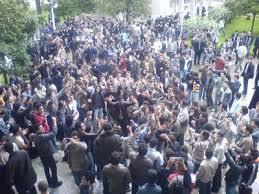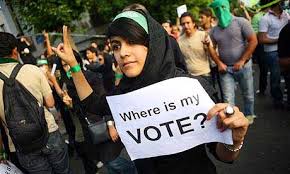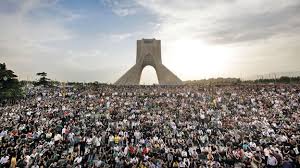
By M K Bhadrakumar
Israelis are realists par excellence. This is why it is always gainful to buttonhole an Israeli counterpart over a single-malt on the diplomatic circuit. He will invariably weave into the tapestry of the plain tale a nylon thread until then obscure to the naked eye.

Thus, the first warning that the adventurous project to mount a "Twitter revolution" in

If any doubt lingers, that also is dispelled by the fury in the state-controlled Saudi Arabian media's unprecedented, vicious personal attack on both Khamenei and President Mahmud Ahmadinejad - of a kind alien to the culture ofta'arof (politesse) or even taqiyah (dissimulation) in that part of the world.

In an extraordinary media leak at the weekend, just as Khamenei's historic speech at the Friday prayer meeting in
Israelis have a way of saying things. It was a subtle acknowledgement of political realities in

He explained: "The world, and we, already know Ahmadinejad. If the reformist candidate Mousavi had won,
The assessment is faultless, perfect. By a masterstroke in "back-channel" diplomacy,
The regime's base has benefited from Ahmadinejad's largesse, and the rest of Iranian society is not sure anyone could do better. Ahmadinejad's principal weakness is his failure to bring the rich and corrupt mullahs to justice, as he had promised. His supporters say that would be the priority in his second term. ... Today, he is the authentic leader of the Khomeinist movement in a way that Mousavi, or [former President Mohammad] Khatami, or any of the other half-way-house Khomeinists could never be.
Mousavi's limitations
Nonetheless, Mousavi kindled hopes in the West - notably
Taheri, who rubs shoulders with the Arab and Western political elites with elan, offers insights into the Mousavi camp. He recalls that the man who led the lengthy
Unsurprisingly, Taheri estimates that while Mousavi's fame might have spread far and wide in the Western intelligence circles, his principal appeal at home is confined to the urban middle classes who wish the "Khomeinist revolution would just fade away ... People like Mousavi and former presidents Mohammad Khatami and Hashemi Rafsanjani have long ceased to be regarded as genuine revolutionaries".
From another direction, Taheri came to virtually the same definitive conclusion as the Israeli intelligence chief reached. Namely, that a weak interlocutor without a "Khomeinist base" like Mousavi could never make concessions that the 
Looking back at the past four years, the fact remains that Ahmadinejad restored the connectivity of the regime with the radical populist discourse. "Four years ago", Taheri writes, "the image of the regime was one of a clique of mid-ranking mullahs and their business associates running the country as a private company in their own interest. The regime's 'downtrodden' base saw itself as the victim of a great historic swindle. Under Ahmadinejad, a new generation of revolutionaries has come to the fore, projecting an image of piety and probity, reassuring the 'downtrodden' that all is not lost."
Ahmadinejad's populism is a double-edged sword. If carried too far, it may undermine the legitimacy of the regime, which included corrupt sections of the clerical establishment. But Ahmadinejad is a clever politician. He has certainly grown while on the job these past four years. Although he self-portrayed with gusto as a locomotive that charges ahead without brakes or reverse gear, he knew where to stop and when to glance over his shoulder. Thus, he hit at many corrupt practices and threatened to bring key figures to justice, but stopped short of landing the big catch. The big question is whether Ahmadinejad will cast his net wide in his second term. 
Rafsanjani outmaneuvered
However, Khamenei remains the ultimate arbiter. Ahmadinejad publicly acknowledged the locus of power by expressing in a formal letter "his gratitude" to Khamenei for his "helpful remarks" at the Friday prayers. Last week's power-play showed that Khamenei effectively thwarted Rafsanjani's attempt to rally the clerical establishment in
The Assembly of Experts is the most powerful organ of the regime, invested with the authority to elect and dismiss the supreme leader and to supervise his functioning. Around 50 members of the Assembly of Experts said in a statement that "enemies of 
Armed with this decisive support, Khamenei came to deliver his historic Friday prayer speech where he ruled out any rethink about the election result. Rafsanjani failed to show up at the prayer meeting, even as Khamenei made clear his support for Ahmadinejad, stressing how closely their viewpoints coincided.
Significantly, Khamenei referred to Rafsanjani by name even in his absence. The message was loud and clear: Khamenei's supremacy is unchallengeable. Most ominously, while Khamenei graciously absolved Rafsanjani of any personal corruption, he left open the possibility of legal proceedings being initiated against his family members. Rafsanjani will now need to weigh his options very carefully. He cannot but factor in the Sword of Damocles hanging over his family members who have allegedly amassed huge wealth through corrupt practices.
Also, Khamenei made no effort to specifically contradict the grave charge leveled by Ahmadinejad during the election campaign that Rafsanjani conspired with the Saudi regime to overthrow his government - an allegation that the president couldn't have made without input from Iranian intelligence, which comes under the supervision of the supreme leader.
On Saturday, the Assembly of Experts went a step further by expressing its "strong support" for Khamenei's speech. It called on the nation to obey Khamenei's guidelines. Also on Saturday, the Iranian armed forces headquarters and the Qom Seminary Teachers Society and several influential voices in the regime publicly rallied behind Khamenei. The so-called reformist clergy aligned with Khatami changed their mind and called off their planned demonstration on Saturday.
The hard reality, therefore, is that Khamenei's awesome powers are in no way under challenge. He can afford to let demonstrations by Mousavi's middle-class followers continue to let off steam, as he has the authority to command the situation in a holistic way. That is to say, even if protests may continue for a while - which seems improbable as Mousavi finds himself in a tight spot - that does not erode state power.
As Taheri put it, "So-called 'Iran experts' did not realize that Mousavi was a balloon that a section of the Iranian middle class inflated to show its anger not only at Ahmadinejad but also at the entire Khomeinist regime. Otherwise, there is nothing in Mousavi's record ... to make him more attractive than Ahmadinejad."
At the end of it all, the international community can only heave a sigh of relief that while this complex and extremely confusing political drama unfolded, George W Bush was no more in the White House in Washington. United States President Barack Obama could grasp the subtleties of the situation and adopted a well-thought-out, measured policy and broadly stuck to it despite apparent pressure from conservatives.
His remarks have not even remotely called into question Ahmadinejad's locus standii, let alone Khamenei's, to lead the country. Nor has Obama identified himself with Mousavi's call for a new poll. If anything, he ostentatiously distanced himself from Mousavi. Certainly, not once did Obama threaten to go back on his offer to directly engage
Meanwhile, Obama has just done some thoughtful fine-tuning in the lineup of the
Clearly, the Iranians took note that Obama's statements remained carefully modulated, although Voice of America might have meddled in the turmoil, as
Mottaki said British forces in
Ambassador M K Bhadrakumar was a career diplomat in the Indian Foreign Service. His assignments included the Soviet Union,





No comments:
Post a Comment